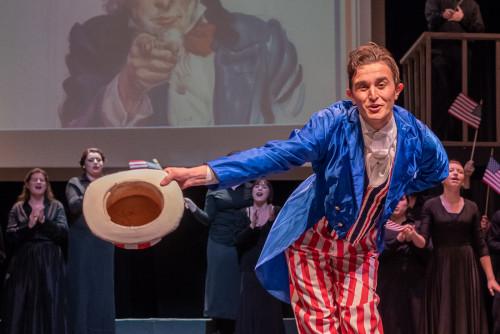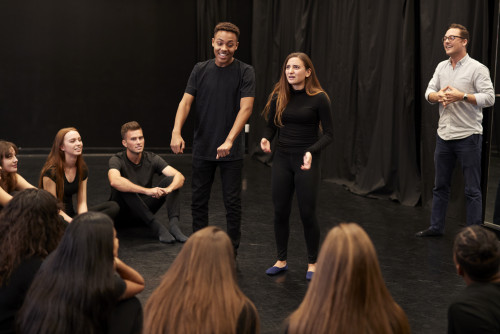Theatre Arts AA-T Degree
Provides students with a common core of lower division courses required to transfer and pursue a bachelor’s degree in Theatre Arts in the CSU system.
Associate in Arts for Transfer | SC Program: AA-T.1004
Theater majors build confidence and public speaking skills, learn how to work together as a team, hone study skills, and develop critical thinking abilities. These are degree benefits that can help you in all areas of your life.
The Theatre Arts program is academically grounded in the liberal arts tradition of literature, performance, cultural studies, history, philosophy, and technical skills. It also provides a hands-on, learn-by-doing environment that gives students experiences and skills to complement many career paths. Employers find theatre trained applicants become valuable employees because they have developed excellent communication and problem-solving skills, confidence, and the ability to work cooperatively with a diverse team of people.



Choose your path
Map your education by viewing the program map for the degree or certificate you’re interested in earning below. Meet with a counselor to create your official comprehensive education plan.
A program map shows all the required and recommended courses you need to graduate and a suggested order in which you should take them. The suggested sequence of courses is based on enrollment and includes all major and general education courses required for the degree.
Fall Semester, First Year
16 Units TotalThis course develops the reading, critical thinking, and writing skills necessary for academic success, emphasizing expository and argumentative writing as well as research and documentation skills. As a transferable course, it presupposes that students already have a substantial grasp of grammar, syntax, and organization, and that their writing is reasonably free from errors. A research paper is required for successful completion of the course. This course may be offered in a distance education format.
Spring Semester, First Year
13 Units TotalThis course is an introduction to the process of human communication with an emphasis on small groups. Subjects covered are preparation for discussion, group participation, leadership, decision-making, interpersonal relations, managing diversity, critical thinking/problem-solving, managing conflict, and evaluation of group interaction. Students will be involved in group interactions, and emphasis will be on practical experience. College-level writing skills will be expected on all papers, outlines, and short essays. This course may be offered in a distance education format.
Fall Semester, Second Year
15 Units TotalThis course takes an interdisciplinary approach to the study of race and ethnicity in the United States. It examines social justice movements in relation to ethnic and racial groups in the United States to provide a basis for a better understanding of the socioeconomic, cultural, and political conditions among key social groups including, but not limited to, Native Americans, African Americans, Asian Americans, and Latina/o Americans. This course examines the systemic nature of racial/ethnic oppression through an examination of key concepts including racialization and ethnocentrism, with a specific focus on the persistence of white supremacy. Using an anti-racist framework, the course will examine historical and contemporary social movements dedicated to the decolonization of social institutions, resistance, and social justice. This course may be offered in a distance education format.
This course is a survey of past life presented through geologic and biologic investigation. This course is interdisciplinary in nature and provides geologic background and evidence for the origination and evolution of life. Associated methodologies and concepts presented include geologic time and its measure, chemical and organic evolution, controls on evolution, cladistic analysis, ancient ecologic reconstruction, mass extinction and adaptive radiation, fossilization, and ancient geographic distributions of flora and fauna. Anatomical innovations that define major classes of organisms are traced through ancestor-descendant relationships. Laboratory exercises include processes of fossilization, fossil recognition, cladistic analysis, genetics, stratigraphy, reconstruction of ancient biologic communities, ancient geographic reconstruction through fossil information, functional morphology, mass extinction and adaptive radiation in the fossil record. The lecture portion of this course may be offered in a distance education format.
This course is an introduction to United States and California government and politics, including their constitutions, political institutions and processes, and political actors. An examination of political behavior, political issues, and public policy, this course satisfies the CSU requirement in U.S. Constitution and California State and local government (US-2 and US-3). This course may be offered in a distance education format.
Spring Semester, Second Year
16 Units TotalThis course is a survey of the history of the United States from Pre-Columbian Peoples to the end of Reconstruction. Topics include contact and settlement of America, the movement toward independence, the formation of a new nation and Constitution, westward expansion and manifest destiny, the causes and consequences of the Civil War, and Reconstruction. This course satisfies the CSU requirement for US History (US-1). This course may be offered in a distance education format.
This course is an introduction to the major concepts of modern biology. Topics covered include biochemistry, cell biology, heredity, and nature of genes, evolution, diversity of life, and principles of ecology. Emphasis will be placed on those aspects of biology that are rapidly reshaping our culture. This course may be offered in a distance education format. This course will meet the general education requirement for a laboratory science if taken with BIOL 10L.
This course provides an introduction to psychology, the study of the mind and behavior, as a science and as an applied field. The course provides an integration of physiological, cognitive, social-behavioral, psychodynamic, humanistic, cultural, and evolutionary perspectives. Topics include research methods, the nervous system, perception, learning, thinking, memory, human development, social behavior, emotions, motivation, personality, abnormal behavior, and psychotherapy. This course may be offered in a distance education format.
Please see a counselor to discuss options for meeting general education requirements for transfer to California State Universities (CSU) and/or University of California (UC) campuses, as well as any specific additional courses that may be required by your chosen institution of transfer.
*Alternative Courses: Please see a Shasta College counselor for alternative course options. You can also view the following to find other courses to meet degree/certificate requirements:
- California State Universities – General Education
- IGETC – Intersegmental General Education Transfer Curriculum
Need a print out? Feel free to download and/or print out a copy of the sample program map(s).
Contact Us for More Information
Counseling & Student Services
Contact InfoAcademic/Instructional Division Office
Art Department
Contact InfoStart Your Future at Shasta College
We are dedicated to helping you reach your educational and career goals. To begin your journey, apply for admissions today!
